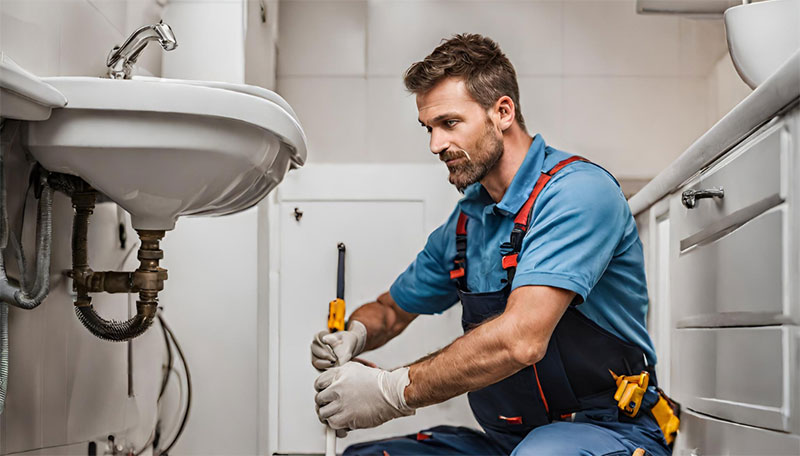Advertisement
Are you contemplating a home improvement project? Whether you’re thinking about refreshing your bathroom or any other part of your home, we’re ready to assist. Whether it’s a remodel, kitchen upgrade, or a complete home makeover, plumbing should be a top consideration. Neglecting your plumbing during a renovation can lead to costly issues. In this article, we’ll explore why you should consider plumbing upgrades during your home renovation and how they can save you from having to call an emergency plumber for plumbing and drain repairs.
- Prevent Plumbing Emergencies
No one desires to encounter a plumbing crisis, yet it can occur without warning. Old, deteriorating pipes and plumbing fixtures can be ticking time bombs during a renovation. Imagine tearing down walls or ripping up floors only to discover a hidden leak or burst pipe. It’s a homeowner’s nightmare.
To prevent such emergencies, consider a comprehensive plumbing inspection before starting your renovation. A skilled plumber has the expertise to spot potential problems and suggest essential repairs or enhancements. The replacement of deteriorating pipes or addressing concealed leaks can prevent future calamities.
- Upgrade Plumbing Fixtures
Enhancing plumbing fixtures stands out as a prominent and influential element of a home renovation. Whether you’re looking to install a luxurious rain showerhead in your bathroom or a modern, energy-efficient dishwasher in your kitchen, these upgrades can enhance your home’s functionality and aesthetics.
Choosing low-flow fixtures and energy-efficient appliances not only helps conserve water and energy but can also lead to reduced utility expenses. Moreover, incorporating modern fixtures can elevate your home’s overall worth, rendering it a prudent, long-lasting investment.
- Enhance Drainage and Water Efficiency
During a renovation, you have the perfect opportunity to improve your home’s drainage and water efficiency. Consider these plumbing upgrades:
- Install a Sump Pump: If you have a basement, adding a sump pump can help prevent flooding during heavy rains. This holds particular significance if your renovation project encompasses the basement.
- Upgraded Water Heater: Replace your old, inefficient water heater with a tankless or energy-efficient model. These options provide hot water on demand, reducing energy consumption and increasing hot water availability.
- Drain Repairs and Upgrades: If you’ve noticed slow drains or persistent clogs, consider professional drain repair or upgrading your drain system. Preventing blockages can save you from future plumbing emergencies.
- Explore Environmentally-Conscious Alternatives
Homeowners are showing a growing inclination towards plumbing solutions that are eco-friendly. These enhancements not only contribute to environmental well-being but also lead to reduced utility expenses. Take into account the subsequent environmentally conscious plumbing alternatives:
- Rainwater Collection System: Gather rainwater for garden irrigation or flushing toilets. It’s an excellent way to reduce water consumption and lower water bills.
- Greywater Recycling: Reutilize water from sinks and showers for watering purposes, resulting in water and cost savings.
- Low-Flow Toilets and Faucets: The installation of low-flow fixtures can lead to a substantial reduction in water consumption without compromising performance.
Incorporating these eco-friendly upgrades can make your home renovation more sustainable and cost-effective in the long run.
- Address Ventilation and Odor Issues
During a renovation, it’s a good time to assess the ventilation in your home, particularly in areas prone to moisture, such as the bathroom and kitchen. Inadequate ventilation can lead to mold and mildew growth, which can be both a health hazard and a costly problem to resolve. Consider upgrading or adding exhaust fans to ensure proper air circulation. This will help maintain indoor air quality and prevent unpleasant odors.
- Optimize Space with Plumbing Relocation
If you’re planning to reconfigure the layout of your home, you may find that relocating plumbing fixtures can help optimize the use of space. Moving a sink or a toilet, for instance, can make your bathroom or kitchen more functional. However, it’s crucial to consult with a plumber and a designer to ensure that the new layout adheres to building codes and is structurally sound.
- Plan for Future Needs
When renovating, think long-term. Consider your future needs and how they may change over time. If you’re planning to age in place or accommodate a growing family, think about installing grab bars, wider doorways, or accessible shower fixtures. Planning for future plumbing needs can save you from costly modifications and make your home more accommodating for years to come.
In conclusion, plumbing upgrades during a home renovation are essential for preventing plumbing emergencies, improving efficiency, and enhancing the overall value of your home. To ensure that your plumbing is in top condition and to avoid needing an emergency plumber, consider consulting a professional plumber before and during your renovation. They can help you plan and execute plumbing upgrades that will benefit your home for years, ensuring your renovation project is a complete success.

